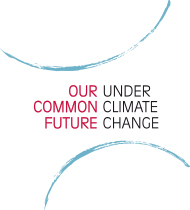Ken CALDEIRA

Ken Caldeira is a climate scientist at the Carnegie Institution for Science, where his job is �to make important scientific discoveries.� He also serves as a Professor (by courtesy) in the Stanford University Department of Environmental Earth System Science. Among Caldeira�s key contributions to science are his relatively early recognition of the threats posed by ocean acidification, his pioneering investigations into the environmental consequences of intentional intervention in the climate system (�geoengineering�), and the first peer-reviewed study to estimate near-zero-emission energy needs consistent with a 2�C climate stabilization target. He has also played a central role in helping to elucidate what our understanding of long-term geochemical cycles implies for the fate of today�s carbon dioxide emissions. Caldeira serves on the U.S. National
Academy of Sciences panel on Geoengineering Climate: Technical Evaluation and Discussion of Impacts.
He is also a contributing author to the Intergovernmental Panel on Climate Change (IPCC) AR5 report Climate Change 2013: The Physical Science Basis.
In 2010, he was a co-author of the 2010 US National Academy America's Climate Choices report and was elected Fellow of the American Geophysical Union. He participated in the UK Royal Society geoengineering panel in 2009 and ocean acidification panel in 2005.
Caldeira was coordinating lead author of the oceans chapter for the 2005 IPCC report on Carbon Capture and Storage."
Shobhakar DHAKAL
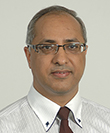
Dr. Shobhakar Dhakal is an Associate Professor at Energy Field of Study of the Asian Institute of Technology in Thailand. His areas of expertize are in urbanization, cities and climate change mitigation; and energy and climate change mitigation policies and modeling. He is also a visiting researcher of the National Institute for Environmental Studies Japan since 2012. Dr. Dhakal served as one of the Coordinating Lead Authors for the Fifth Assessment Report of IPCC for the Working Group on Mitigation (for the Chapter �Human Settlements, Infrastructure and Spatial Planning�). He also co-editor of ongoing international Assessment Report on Climate Change and Cities. He is a member of the scientific steering committee of the Global Carbon Project, which is a premier scientific program under the Future Earth.
In the past, Dr. Dhakal was a guest research scholar of International Institute for Applied System Analysis in Austria for 2010-2013. He has served as a lead author for the Global Energy Assessment, principal scientific reviewer for UNEP�s Global Environmental Outlook-5, member of the Consensus Panel on Low Carbon Cities of the Academy of Sciences of South Africa, member of the Cities Energy Modeling Group of the International Energy Agency, an international expert to the Taskforce on Urban Development and Energy Efficiency of the China Council for International Cooperation on Environment and Development, among others.
Dr. Dhakal is also one of the editor-in-chiefs of Carbon Management journal published by Taylor and Francis. He has over 50 publications including scientific journals, edited books, journal special issues, and others. He holds Ph.D. from The University of Tokyo.
Ottmar EDENHOFER
Ottmar Edenhofer studied philosophy and economics. He is Deputy Director and Chief Economist at the Potsdam Institute for Climate Impact Research (PIK), Professor of the Economics of Climate Change of the Technical University Berlin and Co-Chair of Working Group III of the Intergovernmental Panel on Climate Change (IPCC). Moreover, he is director of the newly founded Mercator Research Institute on Global Commons and Climate Change (MCC) as well as adviser to the World Bank regarding issues of economic growth and climate protection. At PIK he is leading Research Domain III - Sustainable Solutions - that focuses on research in the field of the Economics of Atmospheric Stabilization. He is member of the Science-Industry Cooperation and member of the German National Academy of Sciences Leopoldina, Workgroup Climate, Energy and Environment. He has published articles in Science, Nature, Energy Journal, Climatic Change, Energy Economics, Energy Policy and other peer-reviewed journals and authored a number of books. He was a Lead Author for the Fourth Assessment Report of the IPCC from 2004 until 2007 and recently co-edited the IPCC Special Report on Renewable Energy Sources and Climate Change Mitigation (SRREN). Ottmar Edenhofer�s research explores the impact of induced technological change on mitigation costs and mitigation strategies, as well as the design of instruments for climate and energy policy and the science-policy interface.
Chris FIELD
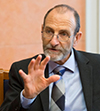
Chris Field is the founding director of the Carnegie Institution's Department of Global Ecology, Melvin and Joan Lane Professor for Interdisciplinary Environmental Studies at Stanford University, and Faculty Director of Stanford's Jasper Ridge Biological Preserve. Field�s research emphasizes impacts of climate change, from the molecular to the global scale. He has, for two decades, led major experiments on responses of California grassland to multi-factor global change. Field has been deeply involved with national and international scale efforts to advance science and assessment related to global ecology and climate change. He is co-chair of Working Group II of the Intergovernmental Panel on Climate Change, which led the effort on the IPCC Special Report on �Managing the Risks of Extreme Events and Disasters to Advance Climate Change Adaptation� (2012) and Working Group II contribution to the IPCC Fifth Assessment Report (2014). He is a recipient of the Heinz Award, the Max Plank Research Award, the BBVA Foundation Frontiers of Knowledge Award, and the Roger Revelle Medal. Field was elected to membership in the National Academy of Sciences (2001), and fellowships in the American Association for the Advancement of Science (2009), the American Academy of Arts and Sciences (2010), the Ecological Society of America (2012), and the American Geophysical Union (2014). Field received his PhD from Stanford in 1981 and has been at the Carnegie Institution for Science since 1984.
Frank GEELS
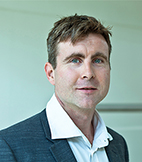
Frank Geels is Professor of System Innovation and Sustainability at the Manchester Institute of Innovation Research (MIoIR) and at the Sustainable Consumption Institute (SCI) at the University of Manchester. Geels is chairman of the international Sustainability Transitions Research Network (www.transitionsnetwork.org), and one of the world-leading scholars on socio-technical transitions and radical innovation. Working in the field of innovation studies, Geels aims to understand the complex dynamics of transitions to sustainability, which derive from interactions between firms, policymakers, consumers, public opinion, social movement organizations and researchers. Geels practices an interdisciplinary research style mobilising insights from evolutionary economics, sociology of technology, neo-institutional theory, social movement and discourse theory. Geels is well-known for this conceptual work on the Multi-Level Perspective (MLP), which he has illustrated and refined with a dozen case studies in the areas of transport, energy and agro-food. He has published six books and more than forty peer-reviewed articles, which have shaped the debate on sustainability transitions. He has twice won a Research Publication Award from IAMOT (International Association for the Management of Technology), and has been selected by Thomson Reuters into their prestigious list of �Highly Cited Researchers�, and identified as one The World�s Most Influential Scientific Minds 2014.
Saleemul HUQ
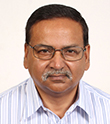
Saleemul Huq is the Director of the International Centre for Climate Change & Development (ICCCAD) since 2009 and intends to support growing capacity of Bangladesh stakeholders, while enabling people and organizations from outside to benefit from training in Bangladesh. ICCCAD runs regular short courses as well as a MSc. program on Climate Change and Development. Dr. Huq is also a Senior Fellow at the International Institute for Environment & Development (IIED) in the UK, where he is involved in building negotiating capacity and supporting the engagement of the Least Developed Countries (LDCs) in UNFCCC, including negotiator training workshops for LDCs, policy, as well as research into vulnerability and adaptation to climate change in the least developed countries. Dr. Huq has published numerous articles in scientific and popular journals, was a lead author of the chapter on Adaptation and Sustainable Development in the third assessment report of the Intergovernmental Panel on Climate Change (IPCC), and was one of the coordinating lead authors of �Inter-relationships between adaptation and mitigation� in the IPCC�s Fourth Assessment Report (2007). Prior to this he was the founding Executive Director at the Bangladesh Centre for Advanced Studies (BCAS), a leading independent research and policy think tank in Bangladesh.
Vladimir KATTSOV
Dr. Vladimir Kattsov is in his 25th year as a research scientist and 8th year as the Director at the Russia�s oldest meteorological research institute, Voeikov Main Geophysical Observatory of the Russian Federal Service for Hydrometeorology and Environmental Monitoring (Roshydromet). His research includes global climate 3D modelling with a focus on the polar climate dynamics. He was a lead author of the IPCC WG1 Third (2001), Fourth (2007), and Fifth (2013-2014) Assessment Reports, as well as of the Arctic Climate Impact Assessment (2005), and the Russian national climate assessments (2008 and 2014).
Dr. Kattsov has worked with the WMO�s World Climate Research Programme as a member of the Working Group on Numerical Experimentation (2000-2005); �Climate and Cryosphere� project�s Scientific Steering Group (2007-2008); Joint Steering Committee of the WCRP (since 2009, as Vice-Chair since 2013).
He is also a member at large of the International Association of Meteorology and Atmospheric Sciences (since 2007), and a member of the Scientific Advisory Committee, Asia-Pacific Economic Cooperation Climate Center (since 2006).
Rachel KYTE
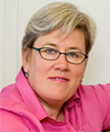
Rachel Kyte is World Bank Group vice president and special envoy for climate change. She oversees work on climate change adaptation, mitigation, climate finance, and disaster risk and resilience across the institutions of the World Bank Group, including IBRD, IDA, IFC and MIGA.
The climate group is focused on ensuring that all Bank Group operations integrate climate change and take into account the opportunities that inclusive green growth presents. The group is also an advocate for global climate action.
Ms. Kyte previously served as World Bank vice president for sustainable development and was the International Finance Corporation's vice president for business advisory services and a member of IFC's management team.
She is Professor of Practice in Sustainable Development at The Fletcher School of Law and Diplomacy. She holds a Master of Arts in International Relations from Tufts University, and a Bachelor of Arts in History and Politics from the University of London.
Herv� LE TREUT

Herv� Le Treut graduated from Ecole Normale Sup�rieure and Universit� Pierre et Marie Curie (UPMC). He is currently professor at UPMC and Ecole Polytechnique, and is the director of Institut Pierre Simon Laplace (IPSL), a federation of 9 major laboratories of the Paris aera active in the field of global environment.
Herv� Le Treut has played an active role in the development of the IPSL Eath System Model, and its application to the study of the anthropogenic climate changes, including the related feedbacks and impacts. He has been actively involved in the various IPCC assessment reports (as contributor, LA, CLA, RE), and a member of the WCRP Joint Scientific Committee.
Nebojsa NAKICENOVIC

Professor Nebojsa Nakicenovic is Deputy Director and Deputy CEO of the International Institute for Applied Systems Analysis (IIASA) and Professor Emeritus of Energy Economics at the Vienna University of Technology.
Among other positions, Prof. Nakicenovic was Director of the Global Energy Assessment, member of the United Nations Secretary General High-Level Technical Group on Sustainable Energy for All; Member of the Advisory Council of the German Government on Global Change (WBGU); Coordinating Lead Author of the IPCC, Co-Chair of the Global Carbon Project, and OMV Resourcefulness Advisory Board.
He is Editorial Board Member of the following ten journals: Technological Forecasting and Social Change; Climate Policy, Institution of Civil Engineers; Current Opinion in Environmental Sustainability; Energy Sector Management; Ecosystem Health and Sustainability; Scientific World Journal; Environmental Innovation and Societal Transitions; and the Energy Strategy Reviews.
Prof. Nakicenovic holds bachelor's and master's degrees from Princeton University and the University of Vienna, where he also completed his Ph.D. He also holds Honoris Causa Ph.D. degree in engineering from the Russian Academy of Sciences.
Among Prof. Nakicenovic's research interests are the long-term patterns of technological change, economic development and response to climate change and, in particular, the evolution of energy, mobility, information and communication technologies.
KAREN O'BRIEN

Karen O'Brien is a professor in the Department of Sociology and Human Geography at the University of Oslo, Norway. Her research has focused on climate change impacts, vulnerability, and adaptation including how climate change interacts with globalization processes and the implications for human security. She is interested in how transdisciplinary and integral approaches to global change research can contribute to a better understanding of how societies both create and respond to change, and in particular how beliefs, values and worldviews influence human responses to climate change and transformations to sustainability. She has participated in the IPCC Fourth and Fifth Assessments, as well as the Special Report on Managing the Risks of Extreme Events and Disasters to Advance Climate Change Adaptation (SREX). She has written and co-edited numerous books about global environmental change, including �A Changing Environment for Human Security� (Earthscan 2013) and �Climate Change Adaptation and Development: Transforming Paradigms and Practices� (Routledge, 2015). She is on the Science Committee for Future Earth, the 10-year global change research initiative. She is also the co-founder of cCHANGE.no, a website that provides news and perspectives on transformation in a changing climate.
Camille PARMESAN

Camille Parmesan is Professor at the Marine Institute, Plymouth University, UK and Dept. of Geology, University of Texas at Austin, USA.
Camille Parmesan's research focuses on the current impacts of climate change on wildlife, from field-based work on butterflies to synthetic analyses of global impacts on a broad range of species across terrestrial and marine biomes. She works actively with governmental agencies and NGOs to help develop conservation assessment and planning tools aimed at preserving biodiversity in the face of climate change. Parmesan has received numerous scientific awards, including being ranked the second most highly cited author in the field of Climate Change from 1999-2009 by Thomson Reuters Web of Science, being named the "2013 Distinguished Scientist" by the Texas Academy of Sciences, and elected a Fellow of the Ecological Society of America. She was awarded the Conservation Achievement Award in Science by the National Wildlife Federation, named "Outstanding Woman Working on Climate Change," by IUCN, and named as a �Who�s Who of Women and the Environment� by the United Nations Environment Program (UNEP). She has worked with the Intergovernmental Panel on Climate Change for more than 15 years, and is a named Contributor to IPCC receiving the Nobel Peace Prize in 2007. Dr. Parmesan is an Adjunct Professor in Geology at the University of Texas at Austin (USA) and a Professor at the Marine Institute, Plymouth University (UK), where she holds the National Aquarium Chair in the Public Understanding of Oceans and Human Health.
Hans Joachim SCHELLNHUBER

Hans Joachim Schellnhuber founded the Potsdam Institute for Climate Impact Research (PIK) in 1992 and has been its Director ever since. He holds a Chair in Theoretical Physics at Potsdam University and is an External Professor at the Santa Fe Institute (USA). From 2001-2005 he also served as Research Director of the Tyndall Centre in the UK and became a Visiting Professor at Oxford University thereafter.
Schellnhuber is currently Co-Chair of the German Advisory Council on Global Change (WBGU), Governing Board Chair of the Climate-KIC of the European Institute of Innovation and Technology (EIT) and Chair of the Standing Committee on Climate, Energy and Environment of the German National Academy of Sciences (Leopoldina). He is an elected member of the Leopoldina, the Academia Europaea, the US National Academy of Sciences (NAS), the Max Planck Society and several other academies. He received, inter alia, the Royal Society Wolfson Research Merit Award (2002), the German Environment Prize (2007) and the Volvo Environment Prize (2011). Schellnhuber was awarded a CBE (Commander of the Most Excellent Order of the British Empire) by Queen Elizabeth II (2004), the Order of Merit of the State of Brandenburg (2008) and the Order of Merit of the Federal Republic of Germany (2011). He holds honorary doctorates from the University of Copenhagen (2011) and Technische Universit�t Berlin (2012). Schellnhuber was given honorary citizenship of his hometown Ortenburg and the Culture Prize of the district Passau (2014).
Schellnhuber has been a long-standing member of the Intergovernmental Panel on Climate Change (IPCC) which was awarded the Nobel Peace Prize in 2007. He served as Chief Government Advisor on climate and related issues during the German G8/EU twin presidency in 2007 and serves as a principal advisor to the European Commission President Barroso. He is a member of numerous national and international panels addressing scientific strategies and sustainability issues. Schellnhuber has authored, co-authored or edited more than 250 articles and more than 50 books in the fields of condensed matter physics, complex systems dynamics, climate change research, Earth System analysis, and sustainability science.
[Foto Hollin, 2009]
Youba SOKONA
Dr Youba SOKONA works at the South Centre as a Special Advisor on Sustainable Development, an Intergovernmental Organization of Developing Countries intended to meet the need for analysis of development problems and experience and to provide intellectual and policy support required by Developing Countries for collective and individual action, particularly in the international arena. Until May 2012, he was the Coordinator of the African Climate Policy Centre (ACPC) based at the United Nations Economic Commission for Africa, a joint initiative of the African Union Commission, the African Development Bank and the United Nations Economic Commission for Africa. Prior to leading the ACPC, he was the Executive Secretary of the Sahara and Sahel Observatory (OSS) based in Tunis, Tunisia from June 2004 to May 2010. A citizen of Mali, his work focus is on the energy, environment and sustainable development nexus and he has broad experience in the African context in policy development. Before joining OSS, he worked for the �Environnement et D�veloppement du Tiers Monde,� based in Dakar, Senegal. Prior to that, he served as professor at Ecole Nationale d�Ingenieur of Bamako in Mali. Throughout his career, he has served in various advisory capacities to African governments. He has published several books and articles on the issues of energy, environment and development with a focus on Africa. He is one of the co-chairs of IPCC Working Group III for the Fifth Assessment Report.
Thomas STOCKER
Thomas Stocker was born in Z�rich and obtained a PhD in Natural Sciences of ETH Z�rich in 1987. He held research positions at University College London, McGill University (Montreal), Columbia University (New York) and University of Hawai'i (Honolulu). Since 1993 he is Professor of Climate and Environmental Physics at the University of Bern. His research encompasses the development of climate models of intermediate complexity, modelling past and future climate change, and the reconstruction of greenhouse gas concentrations based on ice cores from Greenland and Antarctica.
Thomas Stocker has authored or co-authored 180 peer-reviewed papers in the area of climate dynamics and paleoclimate modeling and reconstruction. After more than 10 years of service in the UN Intergovernmental Panel on Climate Change (IPCC) he has been elected Co-Chair of Working Group I in 2008. Thomas Stocker was awarded a Dr. Honoris Causa of the University of Versailles (France) in 2006 and the Hans Oeschger Medal of the European Geosciences Union in 2009. In 2012, he was elected Fellow of the American Geophysical Union.
Dajian ZHU

Dr Zhu Dajian is distinguished professor of School of Economics & Management, Director of Institute of Governance for Sustainable Development, Head of Department of Public Management and Policy, and Vice Chairman of University Academic Committee,at Tongji University in Shanghai. He was awarded the special allowance by China�s State Council in 2000.
His research interests include sustainable development and ecological economics, urban and regional development, public service and public private partnership corporate social responsibility. He was a senior research scholar at Harvard University in 2005 and a visiting research fellow at Melbourne University in 1994-1995.
He is a member of Governance for Sustainability and Circular Economy under Global Agenda Council of World Economic Forum(WEF),has involved in several policy research projects from international organizations such as UNDP, UNEP, UNICEF,WB, ADB etc. and serves on some international journals� editorial board like Ecological Economics,International Journal of Public Management,Environmental Policy and Governance etc.
He is appointed as a member of The State Foundation for Social Sciences, a member of the Social Science Commission under the Chinese Education Ministry, a member of the Experts Commission on Sustainable Development & Resource and Environment under the Chinese Construction Ministry, a special policy advisor for Shanghai Municipal Government and some other Chinese cities, and a sustainable development advisor for Expo 2010 in Shanghai.
He is also members of International Expert Committee of Enel Foundation in Italy,Ellen MacArthur Foundation in UK and Firmenich in Switzerland.
Website:www.pmpp.cn; email:[email protected]
